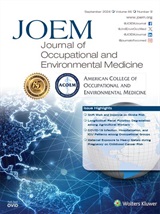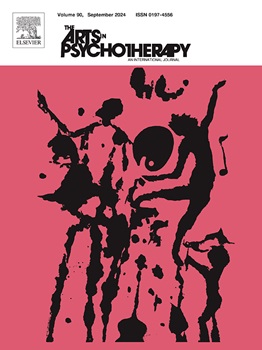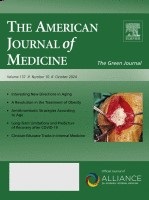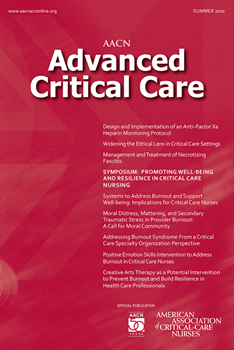
Creative Arts Therapy for Healthcare Professionals Is Associated With Long-Term Improvements in Psychological Distress
Avallone Mantelli, R., Forster, J., Edelblute, A., Sinn, H., Torres, K., Adams, T., Morgan, C., Henry, M., Reed, K., & Moss, M. (2023). Creative Arts Therapy for Healthcare Professionals Is Associated With Long-Term Improvements in Psychological Distress. Journal of occupational and environmental medicine, 65(12), 1032–1035. https://doi.org/10.1097/JOM.0000000000002963
Objective
Burnout in healthcare professionals (HCPs) is a pressing issue in healthcare. We report the long-term impact of our previous creative arts therapy (CAT) intervention for reducing psychological distress in HCPs.
Methods
Healthcare professionals were randomized to CAT intervention or control group. The CAT group completed surveys evaluating symptoms of psychological distress at 4 months, 8 months, and 1 year postintervention, whereas the control group completed surveys at the 1-year mark.
Results
The CAT group demonstrated sustained improvement in distress scores for anxiety, depression, and affect at 4 and 8 months postintervention. At the 12-month mark, the CAT group exhibited improvements in anxiety, depression, and affect compared with the control group.
Conclusion
Creative arts therapy has lasting benefits for HCPs. Long-term follow-ups are crucial for assessing sustainability, and further investigation should focus on disseminating and implementing CAT programs for HCPs.

Creative arts intervention to reduce burnout and decrease psychological distress in healthcare professionals: A qualitative analysis
Torres, K., Glaros, C., Henry, M., Reed, K., Moss, M., Tietbohl, C. (2023). Creative arts intervention to reduce burnout and decrease psychological distress in healthcare professionals: A qualitative analysis. The Arts in Psychotherapy, 83. https://doi.org/10.1016/j.aip.2023.102021
Creative arts therapy (CAT) can potentially mitigate the unprecedented levels of healthcare professional (HCP) burnout that have been exacerbated by the COVID-19 pandemic. However, empirical evidence about the impact of CAT programs is lacking. We conducted focus groups with HCPs (N = 20) who participated in a 12-week CAT clinical trial to enhance the understanding of the effectiveness of the intervention. For HCPs experiencing burnout and psychological distress, our CAT program supported healing and resiliency through building a sense of community. Participants reported that several programmatic components contributed to this sense of community including: 1) diversity of participants’ disciplines, roles, and geographic locations; 2) physical separation between the conduct of the CAT program and their primary place of employment; 3) facilitator skill; 4) collectively contributing to a group project; and 5) being pushed out of their “comfort zone” through the creative activity. Although participants described the particular need for the CAT program in light of additional stressors induced by the COVID-19 pandemic, they believed that this program would have been beneficial pre-pandemic and in the future. To build long-term resiliency, participants suggested that CAT interventions should continue after the 12-week program.

The Effect of Creative Arts Therapy on Psychological Distress in Health Care Professionals
Moss, M., Edelblute, A., Sinn, H., Torres, K., Forster, J., Adams, T., Morgan, C., Henry, M., & Reed, K. (2022). The Effect of Creative Arts Therapy on Psychological Distress in Health Care Professionals. The American journal of medicine, 135(10), 1255–1262.e5. https://doi.org/10.1016/j.amjmed.2022.04.016
Background
Work-related psychological distress is common among health care professionals. We determined whether 4 creative arts therapy (CAT) programs were acceptable, feasible, and improved psychological distress and job turnover intention in health care professionals with burnout symptoms.
Methods
Health care professionals were enrolled during the coronavirus disease (COVID-19) pandemic from September 2020 until July 2021. Participants attended in-person weekly 90-minute group session for 12 consecutive weeks. Intervention and control subjects completed surveys before the beginning and after the end of their cohort. The study outcomes were session attendance (feasibility), program satisfaction (acceptability), and change in symptoms of anxiety, depression, burnout, posttraumatic stress disorder (PTSD), and job turnover intention.
Results
We randomized 165 participants into 4 CAT interventions and 1 common control group across 3 sequential cohorts. Thirty-five randomized participants dropped out before the start of the cohort, and 16 were replaced from a waiting list. Therefore, the cohort consisted of 146 participants. On average, participants were 35 years old, white (85%), and female (92%). Overall, 52% were nurses, 10% were doctors, and 16% were behavioral health specialists. Participants attended a median of 9.5 [8-11] sessions. Program satisfaction was high with a median Client Satisfaction Questionnaire (CSQ-8) score of 31 [17-32] out of a possible score of 32. Participants randomized to the intervention had improvements in anxiety ( P < .0001) and depression scores ( P = .0007), total posttraumatic stress disorder score ( P =.0002), burnout scores ( P = .001, .003, .008), and turnover intention ( P = .001).
Conclusions
A CAT program is feasible, acceptable, and may reduce psychological distress and turnover intention for health care professionals.

Creative Arts Therapy as a Potential Intervention to Prevent Burnout and Build Resilience in Health Care Professionals
Reed, K., Cochran, K. L., Edelblute, A., Manzanares, D., Sinn, H., Henry, M., & Moss, M. (2020). Creative Arts Therapy as a Potential Intervention to Prevent Burnout and Build Resilience in Health Care Professionals. AACN advanced critical care, 31(2), 179–190. https://doi.org/10.4037/aacnacc2020619
The delivery of health care is undergoing a rapid evolution that is dramatically changing the way health care professionals perform their job responsibilities. In this increasingly stressful work environment, professionals are experiencing alarming rates of burnout. Recent efforts to enhance wellness have been directed toward organizations. However, because of the nature of the work performed in intensive care units, interventions to develop individual resilience are also needed. Currently, medical centers are environments in which the emotional impact of work-related trauma is often minimized and rarely processed. Some individuals may struggle to describe or express the impact of those traumas. Through nonverbal interventions, creative arts therapy can help people access, explore, and share authentic emotion in visual, musical, physical, or written form. By reconstructing meaning through transformative methods, participants may confront, reflect, and better cope with traumatic experiences while catalyzing social support networks and deepening relational bonds in the workplace.
(1/5)
(2/5)
(3/5)
(4/5)
(5/5)